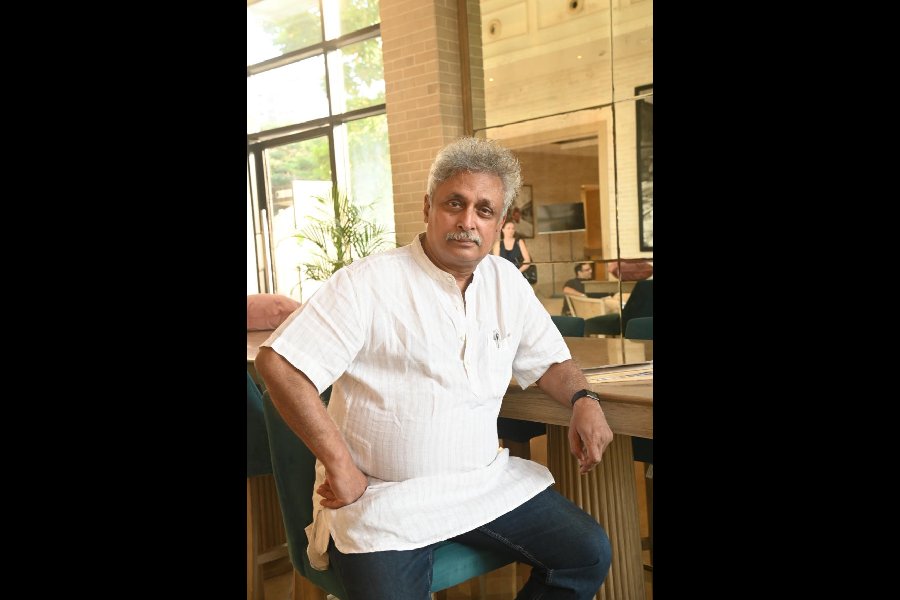If you’ve seen his videos on social media lately, you’d know just how popular his shows are. Piyush Mishra’s band Ballimaaraan has been on the move for over a year now. Early this year, he made audiences in Washington, Detroit, Chicago
and other US cities cry in delight with his powerful lyrics and passionate rendering. That was Aarambh 2.0.
And then another beginning, another string of concerts. This time to promote his debut album UdanKhatola, for which the 62-year-old chose Calcutta as his first stop.
Despite his busy schedule, Mishra answers phone calls and replies to messages. I want to express my appreciation for agreeing to meet me but when I see him, I stop short. The man is on the rug, in vajrasana. Anxious about my own knees, I manage somehow. His show at the Science City Auditorium is four hours away and he is still making phone calls to band members. “Koi baat nahin,” he says, almost inaudibly, when I thank him for his time.
“Ballimaaraan” rings with a certain energy and sense of movement. However, the story behind choosing his band’s name is quite something else. “It was Ghalib Saab’s mohalla; it is still there in Old Delhi. I have always wanted Delhi to be reflected in my work, especially in theatre. What better way to do this than to remember Ghalib Saab?”
Ghalib, poetry, poignant lyrics, all very well… but the creative process for Mishra is rooted in shor. The sounds of the city, of everyday life, audiences cheering. “Mujhe shor bahut pasand hai. I write in the presence of everyone. Most of my major songs — Ghar, Aarambh Hai Prachand, Husna, Ek Bagal Mein — were written in front of Mandi House. I had a spot there, beside the fountain. Tea was in constant supply. People would stop and ask — Have you eaten, have you had a smoke? Autos and buses went by, it was all in the middle of bustling life.” Then adds, “Silence is needed when I meditate but
not while working.”
Is there something you are trying to communicate to your audiences, I ask. “My lyrics. I write about socially and politically relevant things, issues rooted in society. For example, the song Ghar. It isn’t a bubbly love song. We had staged a play called Jab Shahar Hamara Sota Hai, an adaptation of Westside Story. Our play was about a Muslim girl and a Hindu boy against the backdrop of communal riots. And the two sing Ujla-ujla shahar hoga jisme hum tum banayenge ghar.”
It is indeed poetic, every inch of the strain. Poetically political, not overtly political, I think aloud. “Haan, main seedha war karna nahin chahta... I do not want to attack directly,” he says.
In a recent interview, Mishra said, “I want my songs to be sung by children, understood by children”. What does this mean, I ask him, especially in today’s context? “I have been writing for 40 years now. It is always for the current generation. If the youth understand my words, I am happy.”
It is as if Mishra is another persona, vastly different from what we see of him in public. Matter-of-fact, to the point, talks quickly and waits almost impatiently for the next question.
To change the tenor, I talk about the song I like most. If there ever was a stream of words that swelled into a river, and that river flooded the hearts of millions, it would be the one about the roti and the moon.
Mishra’s face barely gives away the hint of a smile when he interrupts, “People like to see it as a mystic song, but it isn’t. Each of my songs has been written in a maximum of two days. Ek Bagal Mein Chand Hoga was first performed in 1996. This was for a play called Ek Thi Seepi Ek Thi Seeli staged at Lady Shri Ram College (LSR) in Delhi. Much later, Anurag (Kashyap) looked at my book and chose it for Gangs of Wasseypur. I think it fitted well.”
What about Husna? This one is from a play staged in 1990, again at LSR. Mishra rattles off the date — January 30. “Anar Ke Pattar, a story by Pakistani writer A. Hameed. I sang for them.” It became a huge hit later, he adds.
The conversation turns. I want to know what he as a person takes home after the curtain falls. “Nothing,” he replies. “I just go home and sleep. If a show goes well, I sleep, if it doesn’t, I sleep. I practise meditation and it goes on. But if I don’t engage in vipassana for even a single day, I feel something is missing.”
Not many know but Mishra has a link with the 1989 blockbuster Maine Pyar Kiya — there was talk of the young NSD actor playing Prem. Mishra’s expression tells me I should not have asked him this. “I wasn’t selected for the role; the media made a story out of nothing. Sooraj Barjatya’s father saw me at NSD. Us samay main khubsoorat thha… I used to be good-looking then. The NSD director too said I act well. So Raj Kumar Barjatya invited me. I was to graduate in two months. I was not doing any great work there, but I just did not go to Bombay.”
And just like that he gets up. One last question. What will his new album be like? “It will be ready in March and will have at least five songs, songs that people have heard little of.”










